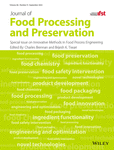Siamese network-based computer vision approach to detect papaya seed adulteration in black peppercorns
Abstract
Food adulteration is a growing peril for consumers, traders, and manufacturers worldwide. Food fraud costs the economy a fortune and creates mistrust among consumers and merchants. Black Pepper is a valuable and heavily adulterated spice. This study explores the ability of deep learning coupled with image processing to identify black pepper contaminated with its common adulterant papaya seeds. Prevalent methods work on a relatively small sample, requiring specialization and resources. Our research proposes a system to quickly and economically obtain a method to trace added impurities. It is a problematic venture for one-shot image classification systems to differentiate between identical entities. Therefore, we implement a Siamese network that is proficient in it. A data set of 2,000 images of each class is created. After experimentation, the training and validation accuracy of 0.96 and 0.92 is obtained, while human eye judgment of the same images gave a correctness score of 0.97.
Novelty impact statement
A novel non-destructive, agile, cost-effective, user-friendly technique to trace papaya seeds' adulteration in black peppercorns using Artificial Intelligence. The proposed system is better in accuracy than the majority of existing approaches.
CONFLICT OF INTEREST
The authors have declared no conflicts of interest for this article.
Open Research
DATA AVAILABILITY STATEMENT
Research data are not shared.




